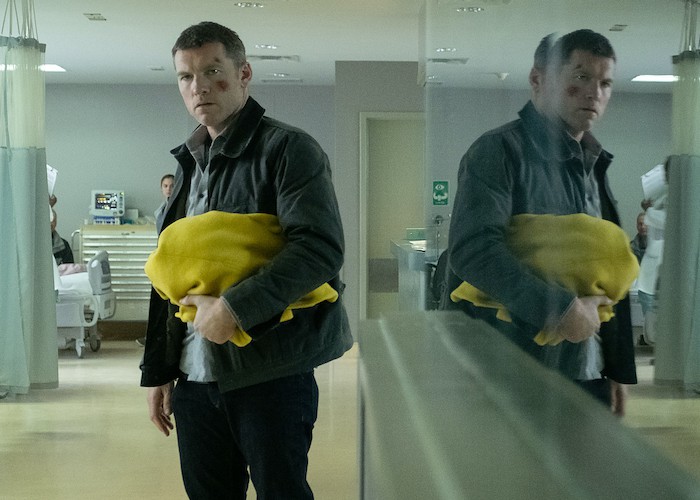This week, we gave our group of interns a challenge: pick a movie from the past decade that didn’t seem like it was for you, so you didn’t see it. Watch that movie and review it. You can find all of their reviews on the Projects page.
In Brad Anderson‘s Fractured, a man questions his sanity after his wife and daughter go missing in a rural hospital. The psychological thriller stands out due to its thought-provoking premise and recognizable cast, but there’s much to be desired from its execution, playing like a cheap amalgamation of similar films without ever asserting its intentions in a clear fashion.
The film begins as a mild critique of the American healthcare system as it focuses on overcrowding, insurance issues, and out-of-pocket medical bills. Soon, the story veers down an increasingly convoluted path. During a road trip, Ray (Sam Worthington) and his daughter (Lucy Capri) are injured and rush to a nearby hospital. After he loses track of the young girl and his wife, Joanne (Lily Rabe), he first suspects a doctor (Stephen Tobolowsky) and his whole institution of foul play. As Ray continues to search for answers and seems to discover a murderous plot involving the hospital’s orderlies, we discover the depths of his distorted mind.
Simultaneously predictable and unfathomably illogical, Fractured reminds us that less is more when it comes to plot twists. Unsane, Shutter Island, The Lady Vanishes, and Anderson’s own earlier movies The Machinist and Session 9 are all clear inspirations for this meandering thriller, but Fractured’s twist is foreseeable early on and its conclusion feels like a cop-out. There are many aspects to Fractured which undermine its overall impact as a thriller, but its inconsistent ending is most frustrating to experience.
The cast works hard to ground the story in reality, and most of them succeed. Rabe and Tobolowsky are reliable as ever, but they’re relegated to small roles that offer little range or opportunity to salvage the story. Capri is the closest this movie has to a breakout star, yet it’s Worthington who has to carry the entire film, and he does so with surprising commitment and charm.
Still, good acting can’t save a problematic screenplay, and it’s Alan B. McElroy who deserves the brunt of the blame for the film’s missteps. The narrative is traditionally structured but lacks momentum. The characters’ motivations are easy to identify with, but the stiff dialogue undermines their authenticity and, subsequently, our engagement with the entire story.
Visually, the film looks more like a dreary television drama than a horror movie. The shots have a sterile quality to them and are darkened by a grey tint. The use of slow-motion and slow camera movement feels both lethargic and cliché. Fractured‘s plot twist relies on the contrast between what Ray sees and what actually happened, but the cinematography and editing make that disparity too stark to be realistic, pushing the whole narrative into even more absurd territory, which undermines both our empathetic relationship to Ray and the believability of the entire film. While a subtler approach may not have shocked audiences as strongly, it would’ve provided a more thoughtful payoff that also doesn’t turn our protagonist into any sort of a “crazy widow.”
Fractured doesn’t add anything new to the subgenre of suspense films about mental illness. In its best moments, it’s a generic conspiracy thriller. In its worst, it’s a tired and tactless retreading of an offensive horror trope. Hyperbolic stories about “crazy” people in an unsympathetic world do little to foster understanding in viewers and a great deal to increase the already omnipresent negative stigma around mental illness. By reducing disorders, syndromes, and conditions to scary plot twists, filmmakers like Anderson are punching down on the disabled community.
Fractured is ambitious, but it’s overstuffed with ideas that are too far disconnected to its ultimate implications. An ableist tale that prioritizes showy spectacles over moral and sensible storytelling, Anderson’s film is disappointingly lazy. It has a great deal of potential early on but opts for an easy ending over a more adventurous exploration of mental health, unethical practices in US healthcare, and insurance schemes. While similar films carefully toy with their audience’s expectations, Fractured lacks any sense of control over its narrative or our reactions to it.

